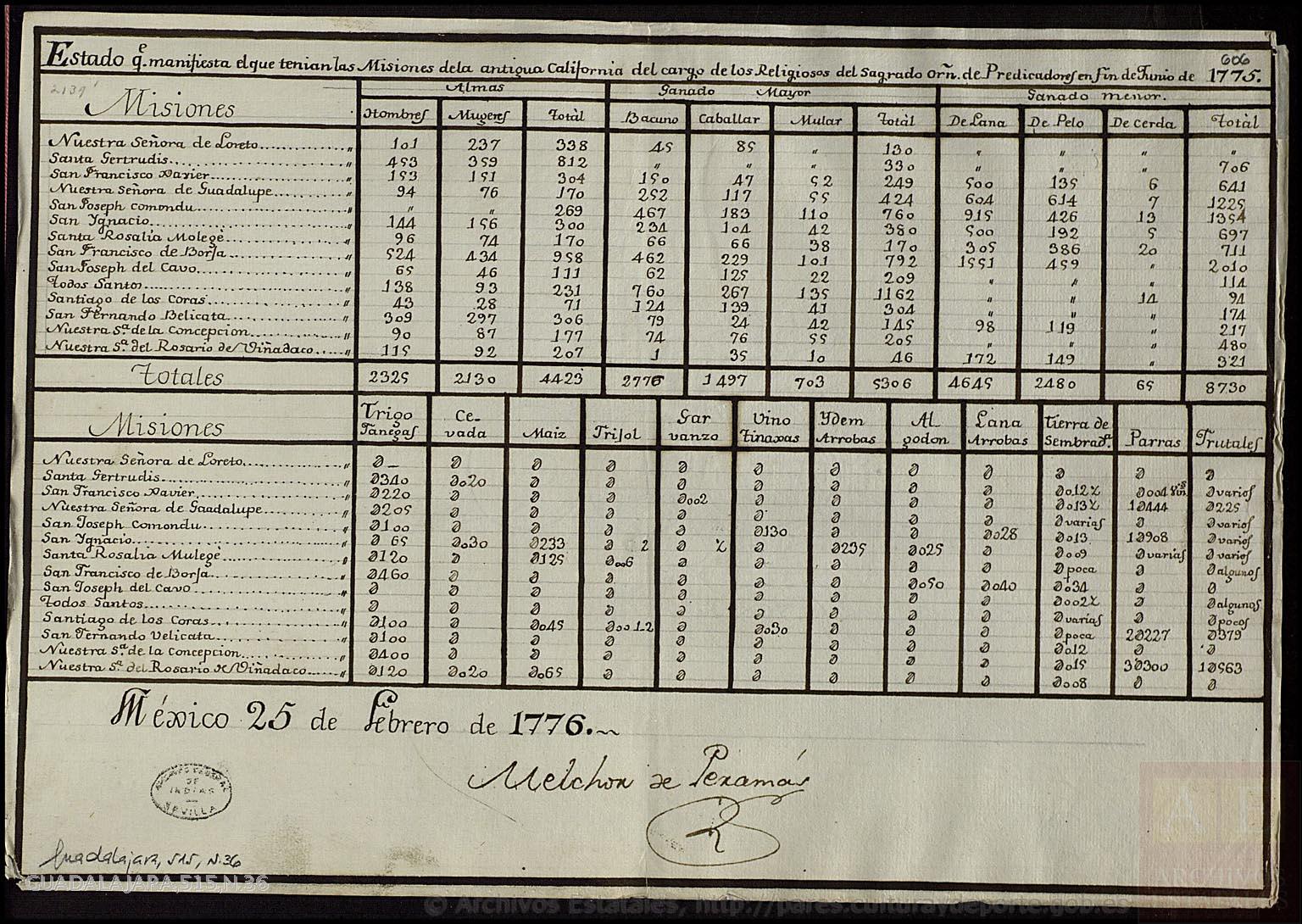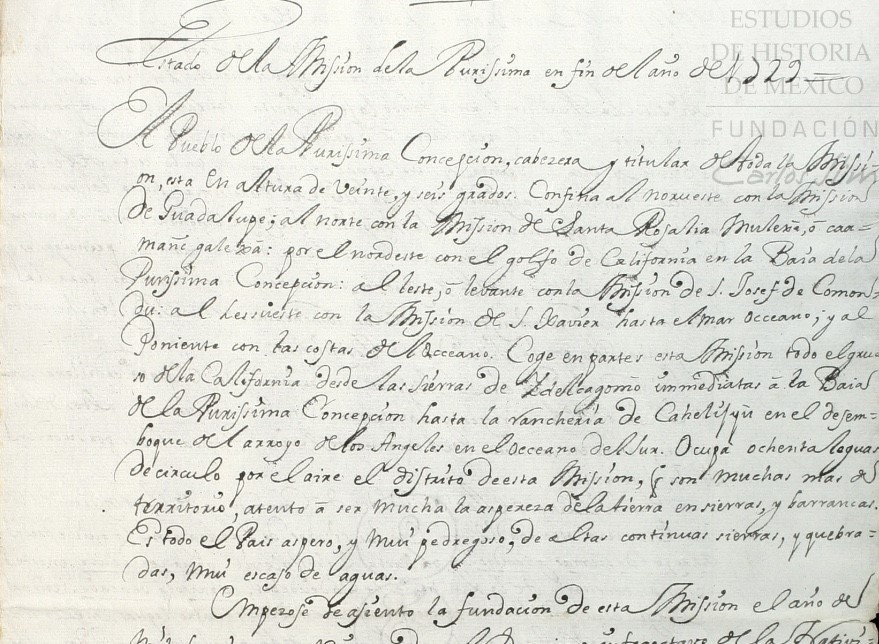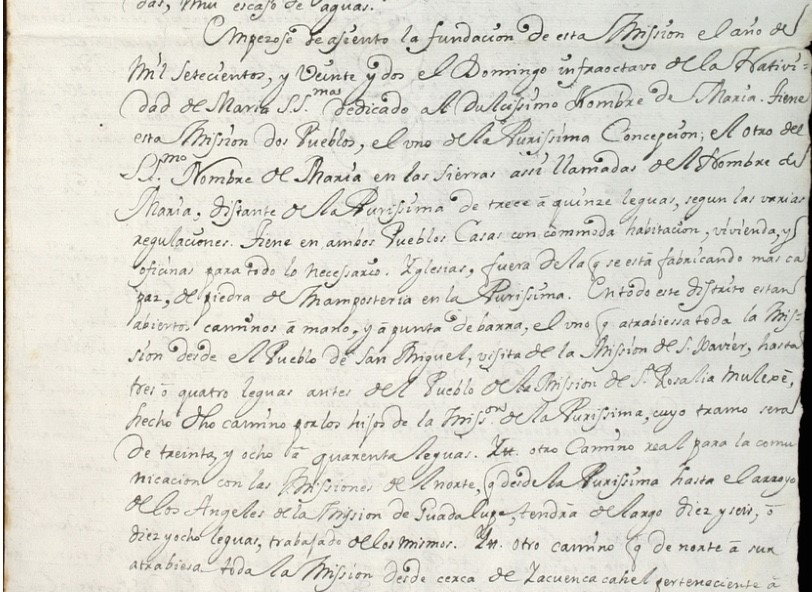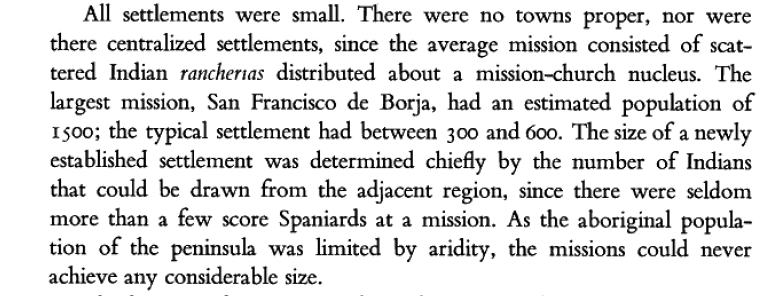David K
Honored Nomad
        
Posts: 65453
Registered: 8-30-2002
Location: San Diego County
Member Is Offline
Mood: Have Baja Fever
|
|
1774 & 1776 Mission Lists with population and other figures
These were from two old sets of pages sent to me from one of my Baja Missions Facebook group fans in Mexico...


To see them in full size, go to www.VivaBaja.com and see the two links in the History section.
|
|
|
David K
Honored Nomad
        
Posts: 65453
Registered: 8-30-2002
Location: San Diego County
Member Is Offline
Mood: Have Baja Fever
|
|
I welcome the Spanish speakers to translate any of it! I have to move along but can try later, but some words are spelled oddly (old Spanish maybe?).
|
|
|
mtgoat666
Platinum Nomad
       
Posts: 20681
Registered: 9-16-2006
Location: San Diego
Member Is Offline
Mood: Hot n spicy
|
|
Quote: Originally posted by David K  | | I welcome the Spanish speakers to translate any of it! I have to move along but can try later, but some words are spelled oddly (old Spanish maybe?).
|
dk:
both provide census of people and livestock. the second one also lists ag quantities. interesting that equine totals are generally equal to or
greater than bovine. i have looked at a fair number of livestock census for ranch records in USA in 1800s and bovine usually far exceed equine.
wonder if the relatively higher equine numbers in mex is because they were raising equine for meat?
Woke!
Hands off!
“Por el bien de todos, primero los pobres.”
“...ask not what your country can do for you – ask what you can do for your country.” “My fellow citizens of the world: ask not what America
will do for you, but what together we can do for the freedom of man.”
Pronoun: the royal we
|
|
|
David K
Honored Nomad
        
Posts: 65453
Registered: 8-30-2002
Location: San Diego County
Member Is Offline
Mood: Have Baja Fever
|
|
Thanks goat, I did get that was the the general purpose, most words I know... I was hoping for translations of each column by anyone bilingual (like
lencho) who was interested... I am just too tired to, currently. Too many pokers in the fire.
|
|
|
JZ
Select Nomad
      
Posts: 14159
Registered: 10-3-2003
Member Is Offline
|
|
Were these docs created in 1774 and 1776.
|
|
|
David K
Honored Nomad
        
Posts: 65453
Registered: 8-30-2002
Location: San Diego County
Member Is Offline
Mood: Have Baja Fever
|
|
Yes, do you see the dates on them? They were in a larger folio from the archives. If anyone can read the 1700s Spanish writing, then all of us might
enjoy it more.
|
|
|
mtgoat666
Platinum Nomad
       
Posts: 20681
Registered: 9-16-2006
Location: San Diego
Member Is Offline
Mood: Hot n spicy
|
|
Quote: Originally posted by David K  | | Yes, do you see the dates on them? They were in a larger folio from the archives. If anyone can read the 1700s Spanish writing, then all of us might
enjoy it more. |
dk:
google translate and a spanish-english dictionary are tools a historian like you should know! the column headings are actually quite easy, try a few
google searches and you'll get it down. first columns are souls (almas), hombres and mujeres (men and women, but more likely male and female in this
context). cows, horse, mules, sheep, goats, sows, etc. Get out your google!
Woke!
Hands off!
“Por el bien de todos, primero los pobres.”
“...ask not what your country can do for you – ask what you can do for your country.” “My fellow citizens of the world: ask not what America
will do for you, but what together we can do for the freedom of man.”
Pronoun: the royal we
|
|
|
JZ
Select Nomad
      
Posts: 14159
Registered: 10-3-2003
Member Is Offline
|
|
Quote: Originally posted by David K  | | Yes, do you see the dates on them? They were in a larger folio from the archives. If anyone can read the 1700s Spanish writing, then all of us might
enjoy it more. |
Yeah, I saw the dates. I was wondering because the writing and organization of the doc is so outstanding.
|
|
|
bajaric
Senior Nomad
  
Posts: 676
Registered: 2-2-2015
Member Is Offline
|
|
It looks modern, not like a document that is 247 years old and written with a quill pen. Any other examples of such precisely written documents from
the same time period?
Who was "Melchor of Panama"
|
|
|
David K
Honored Nomad
        
Posts: 65453
Registered: 8-30-2002
Location: San Diego County
Member Is Offline
Mood: Have Baja Fever
|
|
Quote: Originally posted by bajaric  | It looks modern, not like a document that is 247 years old and written with a quill pen. Any other examples of such precisely written documents from
the same time period?
Who was "Melchor of Panama" |
The person sharing this with me is named Cesar... He has sent me a few samples from the folio (mission books). This one is about La Purísima:


My Facebook friend, Cesar, did his best to type out the handwritten report and I ran that through Google Translator... a couple words he did not
understand (...?) and (of course) Google isn't perfect:
State of the mission of La Purísima at the end of the year of 1729
The town of Purísima Concepción, head and holder of the entire mission, is at an altitude of twenty-six degrees. Contiguous to the northwest with
the Mission of Guadalupe, to the north with the Mission of Santa Rosalía de Mulegé, to the northeast with the Gulf of California in the Bay of the
Immaculate Conception, to the east with the Mission of San José de Comondú, to the southeast the mission from San Javier, to the oceanic sea, and to
the west with the coasts of the ocean, this mission takes in parts the whole bulk of California from the mountains of …….? Immediately to the Bay
of the Immaculate Conception up to the ranchería of …… ? At the mouth of the Arroyo de los Ángeles in the southern ocean.
The district of this mission occupies eighty leagues of a circle by air, there are many more of the territory, considering that the roughness of the
land is great in sierras and ravines, the entire country is rough and very stony with high and continuous sierras and ravines, very scarce of waters.
The seat of the foundation of this mission began in the year of one thousand seven hundred and twenty-two, on the intra-eighth Sunday of the Nativity
of the Most Holy Mary, dedicated to the Most Sweet Name of Mary.
------------------------------------------------------------------------------------------------------------------------------
Here is Cesar's Spanish text that the above was translated and some edits from me to correct directions and capitalizations:
Estado de la misión de la Purísima en fin del año de 1729
El pueblo de la Purísima Concepción, cabeza y titular de toda la misión, está en altura de veinte y seis grados. Contigua al noreste con lamisión
de Guadalupe, al norte con la misión de santa Rosalía de mulege , por el noreste con el golfo de California en la bahia de la purísima
Concepción,al este con la misión de san Josef de Comondu , al poniente la misión de san Javier, hasta el mar oceanico , y al poniente con las
costas del océano , coge en partes está misión todo el grueso de la California desde las sierras de …….? Inmediatas a la bahía de la Purísima
Concepción hasta la ranchería de …… ?
En el desemboque del arroyo de los ángeles en el océano del sur .
Ocupa ochenta leguas de círculo por aire el distrito de esta misión, son muchas más del territorio, atento a ser mucha la aspereza de la tierra en
sierras y barrancas , es todo el país áspero y muy pedregoso de altas y continuas sierras y quebradas, muy escaso de aguas , empezó se el asiento
de la fundación de esta misión el año de mil setecientos y veinte y dos , el domingo intraoctavo de la natividad de maria santísima , dedicado al
dulcísimo nombre de Maria
[Edited on 5-9-2023 by David K]
|
|
|
David K
Honored Nomad
        
Posts: 65453
Registered: 8-30-2002
Location: San Diego County
Member Is Offline
Mood: Have Baja Fever
|
|
Here is the link to one report, in the archives of the Indies in Sevilla, Spain.
Carta nº 1522 de Antonio María de Bucareli y Ursúa, virrey de Nueva España, informando sobre las misiones de San Fernando de Velicatá y
Santa María de los Ángeles, en Baja California, y remitiendo un estado general de todas ellas.
This one is 14 pages, Sept. 1774, on Missions San Fernando and Santa María... Might be easy to read (double spaced) if you can read Old Spanish:
http://pares.mcu.es/ParesBusquedas20/catalogo/show/12788252?...
|
|
|
David K
Honored Nomad
        
Posts: 65453
Registered: 8-30-2002
Location: San Diego County
Member Is Offline
Mood: Have Baja Fever
|
|
Here is the Feb. 1776 report on all the Baja missions, but not Santo Domingo (8-30-1775), which may not have been operating or long enough when the
data was gathered for this report... 20 pages
http://pares.mcu.es/ParesBusquedas20/catalogo/show/12788337?...
|
|
|
bajaric
Senior Nomad
  
Posts: 676
Registered: 2-2-2015
Member Is Offline
|
|
I'm no expert on old documents. The paper(?) seems quite crisp for something that old, though it is entirely possible that the penmanship is accurate
to the period.
Here is some information, the human population numbers on the above documents match exactly with the numbers in Aschman's book, The Central Desert of
Baja California: Table 9 Populations of Central Desert Missions 1773. e.g. San Borja 1,000, San Ignacio 314 etc. Both sets of numbers were derived
from the same source. Aschmann's reference for these figures was "Ms.AGN-M 12" His abbreviations mean Mission Statistics (Volume 61) Archivo General
de La Nacion Mexico D.F. Misiones 12.
He also noted that 1773 was the year the Dominicans replaced the Jesuits.
Interesting that the human population at San Borja in 1773 (1000) was probably greater than the human population in that general area today. As
Aschmann put it in 1959:
Thus after nearly 150 years in which the Central Desert has been open to settlement by people possessing the technological resources of western
civilization. with substantially no native population to interfere with their activities, the population has risen to only one-fifth the number of the
aborigines whom the missionaries found in the area a century earlier.... In terms of ecological adjustment, at least, modern Mexican civilization has
not matched the achievements of the Indians who once occupied the Central Desert."
|
|
|
4x4abc
Ultra Nomad
    
Posts: 4455
Registered: 4-24-2009
Location: La Paz, BCS
Member Is Offline
Mood: happy - always
|
|
one of the most informative papers on population numbers in Baja is "Settlements in Baja California: 1768-1930"
but this clunky forum does not allow me to post a pdf.
Too modern I guess.
I'll send it to David - he'll find a way yo turn it into a map.
Harald Pietschmann
|
|
|
David K
Honored Nomad
        
Posts: 65453
Registered: 8-30-2002
Location: San Diego County
Member Is Offline
Mood: Have Baja Fever
|
|
Hi Ric, I have added a page to view and it looks quite authentically old. I also added the two folders from Sevilla, Spain with the crisp pages...
maybe reproductions, but easy to read. Aschmann did a super job with what he had available in the 1950s.
The land can only support so much.. and people need a good reason to live in the desert... no jobs, no reason.
The Dominican take over in 1773 was never in dispute, was it?
Jesuits: 1697-1767
Military: Dec. 26 1767- April 1, 1768
Franciscans: 1768-1773
Dominicans: 1773-1855
Can I send you a copy of my book, on-the-house? u2u an address,
|
|
|
bajaric
Senior Nomad
  
Posts: 676
Registered: 2-2-2015
Member Is Offline
|
|
Hi DK, I already have a copy of your book, thanks. You signed it for me at a book fair in Point Loma some years back. Getting senile in your old age
amigo?
Not in dispute that the Dominicans took over in 1773, just that Aschmann noted it in his population chart for that year, and it happened to be the
same year as the Melchor of Panama chart with the same numbers. Maybe the Dominicans, being new to the peninsula, did a population survey that was
widely reported.?
The only way to for large numbers of people to survive in the central desert was the old way, by small groups of 50-150 people that moved around
frequently, foraging for different food sources in the different seasons, and hunting in balance with the game population rather than hunting game
animals to extinction. I think that the climate was cooler and wetter pre-1700 as well. They probably ate a lot of desert rats, skewered on a stick
over the fire. Maybe that could be an idea for a new food at the fair: Rat on a stick!
|
|
|
mtgoat666
Platinum Nomad
       
Posts: 20681
Registered: 9-16-2006
Location: San Diego
Member Is Offline
Mood: Hot n spicy
|
|
Quote: Originally posted by bajaric  | Hi DK, I already have a copy of your book, thanks. You signed it for me at a book fair in Point Loma some years back. Getting senile in your old age
amigo?
Not in dispute that the Dominicans took over in 1773, just that Aschmann noted it in his population chart for that year, and it happened to be the
same year as the Melchor of Panama chart with the same numbers. Maybe the Dominicans, being new to the peninsula, did a population survey that was
widely reported.?
The only way to for large numbers of people to survive in the central desert was the old way, by small groups of 50-150 people that moved around
frequently, foraging for different food sources in the different seasons, and hunting in balance with the game population rather than hunting game
animals to extinction. I think that the climate was cooler and wetter pre-1700 as well. They probably ate a lot of desert rats, skewered on a stick
over the fire. Maybe that could be an idea for a new food at the fair: Rat on a stick!
|
the ag stats lists cotton production at only san ignacio and san borja. i suspect that if they were growing cotton at san borja, then the available
water at that time was a bit more than today. also, the san borja mission is quite large, more than an old adobe. perhaps in late 1700s the area had
wetter climate/more water. the late 1700s are within the "litle ice age" noted in european records,... perhaps that part of baja was cooler/wetter in
little ice age
For example of how even a small/short climate cycle can change things, look at the recent drought in the sierras that has decimated the cattle
ranching in past decade…
It may be that the early mission explorers had a much easier time traveling in baja due to having relatively more water available than today.
[Edited on 5-10-2023 by mtgoat666]
Woke!
Hands off!
“Por el bien de todos, primero los pobres.”
“...ask not what your country can do for you – ask what you can do for your country.” “My fellow citizens of the world: ask not what America
will do for you, but what together we can do for the freedom of man.”
Pronoun: the royal we
|
|
|
4x4abc
Ultra Nomad
    
Posts: 4455
Registered: 4-24-2009
Location: La Paz, BCS
Member Is Offline
Mood: happy - always
|
|
I think the Jesuit records show that the climate in the 1700's was about equal to today

Harald Pietschmann
|
|
|
David K
Honored Nomad
        
Posts: 65453
Registered: 8-30-2002
Location: San Diego County
Member Is Offline
Mood: Have Baja Fever
|
|
Thanks, Harald!
Indeed it was a hot thorny desert, 300 years ago.
The first Spanish colony in California, after failing in 3 months at La Paz (April to July, 1683), returned to the mainland to re-group and try again,
to the north, at San Bruno (15 miles north of Loreto, today) in October 1683.
A small, 3-sided fort was built on a hilltop (the ruins of which could be seen until last year. Someone bulldozed a road to the top of the hill,
cleared all the vegetation, and restacked the rocks to approximately simulate the original work.
Before and after photos here: https://vivabaja.com/san-bruno-1683-1685/
The colony was abandoned less than 2 years later (May 1685) for lack of water and consistent flow of supplies from the mainland. Not
enough water to grow food or keep cattle and people healthy. Scurvy was a major problem for the colonialists.
Armed with the knowledge gained in 1683-1685, Padre Kino now knew how to make the next attempt succeed. The result was the first of 17 Jesuit
missions, at Loreto, in 1697. [more details in the book, 'Baja California Land of Missions']
The Jesuit roads went from mission to mission, via water holes (tinajas) and springs, as water was in such short supply and rare.
Since we know people were on the peninsula over 5,000 years ago, and had the leisure to paint great murals showing an abundance of game to hunt,
perhaps that was a time of wetter climate?
Climate changes very slowly, over thousands of years. Weather changes daily, weekly, or seasonally. As we see in our lives, there are also very wet
years (like now, 2022-2023) separated by 8-12 very dry years. Remember the rains of 2010 that washed out so many bridges south of Ensenada?
Twelve years before that, the rains of 1997-1998 were well documented in Graham's second book, Journey with a Baja Burro, and hindered his (and
Misión's) ability to travel as planned, sheltering at San Borja and other spots, for days.
In the tropical or near tropical southern half of the peninsula, about every year (July-Oct.) are 'chubascos' and every few years a full-on hurricane
will hit. Last year was Hurricane Kay and wiped out many roads on the peninsula, among other kinds of destruction. Many of you remember other
hurricanes and big storms with their flash floods.
The missionaries documented these destructive storms and talked of moving missions, like at Mulegé in 1770. Loreto was abandoned in 1829 after such a
storm with floods causing the capital to relocate south to La Paz, after a short time at San Antonio. A circa-1918 hurricane so damaged the mission
church at San José de Cabo, it was eventually demolished and replaced.
Water comes to Baja, but violently, all in a day or two, otherwise the norm for hundreds of year (or longer) has been dry, hot desert in the places it
is today... with regular cycles of wet between years of dry.
Viva Baja History!
|
|
|
|

